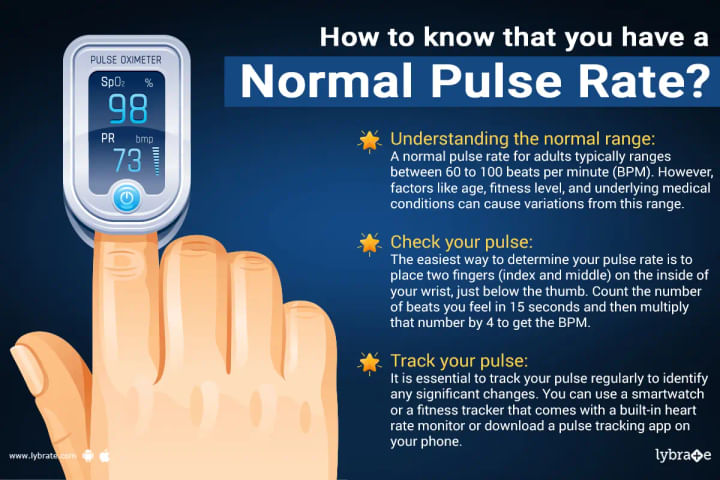Do You Have A Normal Pulse Rate?
Keeping a good and healthy heart is a important thing for a person and you should be looking after this part of your in fact every part of your body throughout your life without any exception but keeping your heart healthy will keep you away from so many unpleasant and majority of the diseases of heart as these diseases are known to make a person's life miserable and a living hell. To keep your heart healthy you should treat yourself really well like a temple, you should eat healthy food, exercise regularly and pay attention to any kind of symptoms that you find to be unusual and one among the many unusual symptoms that is associated with heart problems is said to be irregular pulse rate.
Pulse rate also known as the heart rate, which means and states that how many times your heart has beaten every minute and this is ought to be different for everyone and a lot of factors are known to be affecting it. The normal pulse rate for an adult person is people aged 18 and over will have pulse rate ranging from 60-100 beats per minute while when you are in your childhood from ages 6-17 you will experience your heart beat or pulse rate to range between 70-100 beats per minute.
As pulse rate is affected by so many factors it does not remain constant for anyone, for instance, when you are doing any heavy physical activity or when you are angry, under stress or any other kind of strong emotions then your heart beat is going to shoot up to a very high number of beats per minute. When you gain or lose weight, that is your BMI, your pulse rate still gets affected significantly and the condition of your health and body also plays a major role in the maintenance of your pulse rate.
There is an upper ceiling to which the number of your heart beat could reach and you will not want your heart beat to exceed beyond that number and if it does it will be very fatal for you and your body especially for your heart. To know your maximum number of heart beat in a minute or your pulse rate you can just easily calculate it by using a simple formula which is:
220-your age; for instance if your age is 60 your maximum number of heart beats would be 220-60 which is equal to 160.
You should always pay close attention to your pulse rate because if there is any kind of sudden fluctuation in your heart beat you should notice it as this can be a sign that you might be having a heart disorder which is known as irregular heartbeat or arrhythmia. There is another medical condition associated with your heart beat and unlike the above it can be noticed or observed while you are at rest, while resting if your number of heart beats or pulse rate tends to go above 100 beats a minute you might be suffering from a disorder called tachycardia. Another heartbeat or pulse rate related disorder is bradycardia and this one is for those people who are having a pulse rate under 60 even when they are not under any kind of physical stress or workout.
If you are suffering or feeling that you are having any of the above mentioned problems you should immediately look for a health provider as these conditions require immediate medical assistance. You should not delay or be negligent towards any of the symptoms of these problems and especially to your pulse rate.
You should be in a habit or bring this in your routine to measure your pulse or heartbeat on a regular basis as this would help you to be aware of your health condition and your heart's health. There are various different ways that you can opt for checking your pulse rate and some of those methods are listed below:
- By feeling the flutter of you pulse from the wrist
- Feeling the flutter of the pulse at the side of the neck
- Flutter of your pulse can be felt from the crook of the elbow
- The top portion of the foot can also help you feel the flutter of your pulse
You just have to place your finger on any of the places mentioned above and feel your pulse and the throbbing effect it has for a minute.
Conclusion
You should be aware of the fact that how important your pulse rate is and it has a wide range of effect on your body and heart and it can directly or indirectly effect your health condition as well. You should follow various measures to keep it under the normal levels and if you face any kind of difficulty or symptoms that you are having sudden increase or decrease in the level or persistent fluctuations in your heart beat then you should immediately consult with a doctor to get proper medical assistance.



+1.svg)
